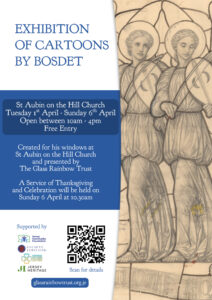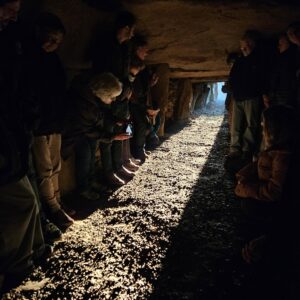
We continue our series of article in Jèrriais – Jersey’s own traditional native language. The ‘frouque’ in question is a digging fork, rather than a table fork. An English translation follows. This contribution comes from Laurence Curtis
Eune Surprînse !
Comme j’sis à écrithe chenna les saîsons ont changi eune aut’ fais. Hièr lé temps ‘tait fraid, gris et mucre et aniet ch’est raiqu’un mio mus – mais tout alentou i’y’a des sîngnes qué l’Èrnouvé s’approche.
Dans l’gardîn les p’tites g’zettes dé gardîn sont en flieurs, les bliuettes arriv’thont bétôt et, tandis qu’ tchiques bouais sont acouo nus, d’s’ aut’s quémenchent à mouontrer lus nouvieaux bourgeons.
Les gros-bés chèrchent des nids et nos visiteûthes d’Hivé, comme des bênaques pensent à tchitter et eune articl’ye dans la Gâzette donnait des nouvelles d’eune aut’ île où’est qu’“l’èrtou des mauves à maq’thé (mèrgauds) mèrque lé c’menchement d’la saîson pouor brider” (jé n’savais pon qu’ les Aur’gnais ‘taient si organnisés!).
Bétôt les vents chang’geont et j’ pouôrrai prendre mon baté à La Rocquetaine.
Ch’est întéressant comment qu’les difféthentes langues font sèrvi des mots tchi sont similaithes ou difféthents pouor les mêmes choses. J’ai apprîns raiqu’un mio d’Jèrriais achteu mais iun d’mes mots favoris est l’mot pouor l’Èrnouvé.
En Francais, ch’est “Printemps”, l’s Espangnos et l’s Italiens ont “Primavera” et l’s Allemands ont “Frühling” – tous réféthent au temps dans l’année. Mais en Jèrriais j’avons “Èrnouvé” – le temps pouor “renewing” quand la vie et la caleu èrtouônnent dans not’ île et not’ esprit s’lève.
Au R’nouvé tout semb’lye êt’ possibl’ye…
Iun des sîngnes du R’nouvé en Jèrri est quand j’viyons pus d’touristes dans nos rues, carte en mains et eune expression încèrtaine sus lus faches. Tchiquefais, j’arrête et j’les aîgue. Ch’est bein pouor tout l’monde. I’ peuvent aller éyou qu’i’ veulent et j’rencontre des gens întéressants – et tchiquefais, j’peux pratitchi des langues s’i’ n’pâlent pon bein l’Angliais (ou même s’i’ sont aimabl’yes!). Souvent ch’est l’Francais mais dé temps en temps j’peux attraîner deux’-trais mots d’Allemand dé l’arriéthe dé ma tête, qué man vièr maît’ Dixie Landick pliantit là y’a bein d’s années.
I’ y’a deux s’maines j’ vis les preunmié touristes dé l’année – deux Angliais tchi chèrchaient un bouôn café – et la s’maine pâssé j’vis deux aut’ femmes dé la Grande Tèrre. I’ ‘taient eune méthe et sa fil’ye tch’ avaient quarante-chînq minnutes pouor èrtouônner au baté mais il’ avaient eune tchestion qué j’n’avais janmais ouïe: “Parlez-vous la langue de Jersey?”!
Tchi surprînse!
Heûtheusement j’ai fait des leçons auve l’Office du Jèrriais et j’pouvais offri deux’-trais mots. I’ tchittîtent surprînses et heûtheuses.
Un tas d’jours pus tard, ma bouonnefemme et mé r’gardînmes un programme sus BBC4 sus la télévision où’est qu’Huw Edwards ‘tait à explyitchi l’histouaithe d’un eune dgaîngue dé Gallouais tchi viagîtent en Argentinne pouor s’êcapper d’s înmigrants Angliais au Pays d’Galles et pouor protégi lus tchultuthe et lus langue!
Ch’est eune histouaithe întéressante – mais duthant l’s années 1960 i’ crûtent qué lus langue mouothit.
Aniet, la langue èrvit et i’ peuvent la ouï dans les rues, les fèrmes et l’s êcoles en Chubut en Patagonie – et les salons d’thée Gallouais sont eune attraction touristique.
Et don, èrtouônnons en Jèrri. Nânnîn, touos nos visiteurs né sont pon întérêssis dans l’Jèrriais – mais ch’est eune part întérêssante dé not’ île. Ichîn j’avons un mio d’ Jèrriais sus nos char-à-bancs et dans les caûchies, mais où’est qu’nou peut l’ouï?
Chutte niet, dans les p’tites heuthes, j’ trouvis eune idée pouor un p’tit projet. J’ai bésouain d’ l’aîgue dé deux’-trais pèrsonnes et p’têt d’s organnisâtions comme L’Office du Jèrriais et Visit Jersey mais – si ch’est un succès, p’têt’ qu’un jour nos touristes, nos êtudgiants et not’ peupl’ye pouôrront ouï l’Jèrriais eune aut’ fais dans les rue d’Jèrri – et, un jour, ch’est même possib’lye qué nou pouôrra vaie des sîngnes dans les boutiques “Ichîn j’pâlons l’Jèrriais”!
Heûtheusement j’ai deux’-trais anmîns tch’ont offri d’aîdgi et ch’est possib’lye qué ch’na marche. Viyons!
Mèrcie bein des fais.
Laurence
……………………………………………………………………………………………………………
A surprise!
As I write this the seasons are changing once more. Yesterday the weather was cold, grey and damp and today is only a little better but all around there are signs that spring is on its way.
In the garden the little daffodils are in flower, the bluebells will arrive soon and while some trees are still bare others are starting to show new buds.
The sparrows are starting to look for nests and our winter visitors, like the barnacle geese, are getting ready to leave and an article in the JEP giving us news from the other islands tolds us that the “Return of the Gannets heralds the start of the breeding season” (I did not know the Alderney folk were so organised!).
Soon the winds will change and I will be able to take my boat back to La Rocque Harbour.
It is interesting to see how different languages use similar or different words for the same thing. I have ony learnt a little Jèrriais now but one of my favourites is the word for “Spring”.
In French it is “Printemps” the Spanish and Italians have “Primavera” and the Germans have “Frühling” – all refer to the time in the year. But in Jèrriais we have “Èrnouvé”. The renovation time when life and warmth come back to our island and our spirits lift.
In Spring anything seems possible..
One of the signs of Spring in Jersey is when we see more tourists stopped in our streets, map in hand with a puzzled look on their faces. Sometimes I stop and help them. It helps us both. They get to go where they want while I sometimes get to meet interesting people and sometimes get the chance to practice my languages if they do not speak much English (or if they are kind!). Often this is in French but sometimes I am able to drag a few words of German from the back of my mind where one of my schoolteachers, Dixie Landick, planted there many years ago.
Two weeks ago I saw the first of these Spring visitors – two English looking for a good coffee – and then last week I saw two more women from Normandy. They were a mother and daughter and they had 45 minutes to get back to their boat but they had a question I have never heard “Do you speak the Jersey language?”!
What a surprise!
Happily I take lessons with l’Office du Jèrriais and I was able to offer a few words. They left surprised and happy.
A few days later my wife and I were watching a programme were watching a programme on BBC on the television where Huw Edwards was explaining the story of a group of Welsh people who travelled to Argentina to escape the English immigrants in Wales and to protect their culture and their language!
It’s an interesting story – but during the 1960s they thought their language was dying.
Today, the language survives and one can hear it in the roads, farms and schools in Chubut in Patagonia – and the Welsh tea rooms are a tourist attraction.
And so back to Jersey. Not every visitor is interested in our language – but it is an interesting part of our island. Here we have a little Jèrriais on our buses and in the ports, but where can one hear it?
That night, in the small hours, I found an idea for a little project. I would need help from a few people and perhaps from organisations such as L’Office du Jèrriais and Visit Jersey but – if it works, perhaps one day our tourists, our students and our people will be able to hear Jèrriais once more in the streets of Jersey – and one day, it’s even possible that we could see signs in the shops “Jèrriais spoken here”!
Luckily I have a few friends who have offered to help and it might work. Let’s see!
Thank you
Laurence





One Response
Great , stuff Laurence, I am impressed. So good to find such enthusiasm. Unfortunately, I have forgotten my Jerriais, which I spoke when I was 3 years old (many moons ago) so it’s really good to read your articles and refresh my memory.. Good luck with the project. Elizabeth Kempster (nee Billot), Charters Towers, Queensland, Australia.